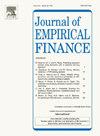Short-term institutional investors and the diffusion of supply chain information
IF 2.4
2区 经济学
Q2 BUSINESS, FINANCE
引用次数: 0
Abstract
What informational advantage do short-term investors have? This paper demonstrates that short-term investors can benefit from the ability to process public, but slowly diffusing, supply chain information ahead of other market participants. In support of this argument, we find that short-term investors establish larger long and short positions in firms with high customer concentration. In addition, an increase in short-term institutional ownership is associated with higher stock returns in firms with high customer concentration, supporting the informational advantage hypothesis. Finally, the relationship between customer concentration and short-term institutional ownership strengthens in high information asymmetry environment. In contrast, we do not find preference towards high customer concentration firms among long-term institutions, who are less positioned to exploit short-lived informational benefits.
短期机构投资者与供应链信息扩散
短期投资者有什么信息优势?本文表明,短期投资者可以从处理公开但缓慢扩散的供应链信息的能力中受益于其他市场参与者。为了支持这一论点,我们发现短期投资者在客户集中度高的公司中建立了更大的多头和空头头寸。此外,在客户集中度高的公司中,短期机构所有权的增加与更高的股票回报有关,这支持了信息优势假说。最后,在高度信息不对称的环境下,客户集中度与短期机构所有权之间的关系增强。相比之下,我们没有发现长期机构对客户集中度高的公司的偏好,这些公司不太可能利用短期信息利益。
本文章由计算机程序翻译,如有差异,请以英文原文为准。
求助全文
约1分钟内获得全文
求助全文
来源期刊

Journal of Empirical Finance
Multiple-
CiteScore
3.40
自引率
3.80%
发文量
59
期刊介绍:
The Journal of Empirical Finance is a financial economics journal whose aim is to publish high quality articles in empirical finance. Empirical finance is interpreted broadly to include any type of empirical work in financial economics, financial econometrics, and also theoretical work with clear empirical implications, even when there is no empirical analysis. The Journal welcomes articles in all fields of finance, such as asset pricing, corporate finance, financial econometrics, banking, international finance, microstructure, behavioural finance, etc. The Editorial Team is willing to take risks on innovative research, controversial papers, and unusual approaches. We are also particularly interested in work produced by young scholars. The composition of the editorial board reflects such goals.
 求助内容:
求助内容: 应助结果提醒方式:
应助结果提醒方式:


